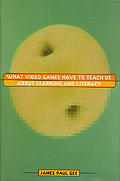Video Games and the Art of Learning Well
|
|
Review of James Paul Gee's provocative new book.
Video and computer games are so popular that the video gaming industry currently makes more money than the film industry. Yet until now, few scholars have seriously studied the learning potential of these games. In What Video Games Have to Teach Us About Learning and Literacy, James Paul Gee dissects the "mechanics" of learning and relates them to the processes involved in playing a good video game.
Gee believes that video game designers have much to teach us about learning environments. He wryly contends that game designers have thought deeply about the best way to design learning environments, since "good capitalists that they are…if no one can learn their games, no one will buy them." The book details the inherent ability of good video games to engage and motivate learners through a frustrating, yet life enhancing learning curve. Gee likens it to the perverse pleasure that students find in doggedly solving difficult academic problems. Introduced to video games by his own child, Gee reports in the first person about his experiences with a wide range of video games and distills them into 36 learning principles that can be used to transform contemporary education.
"The premise is NOT that what people learn when they are playing video games is always good, but rather that what they are doing when they are playing video games is often good learning!"
— Tessa Jolls, Center for Media Literacy
After hours of immersion with the games, Gee found that the theories of learning in good games are the same theories of learning found in cognitive science. The book gives concrete and detailed examples of the way that gaming can promote active learning, critical thinking, problem-solving, and "embodied learning," the concept of mind and body working together to imprint new knowledge and skills. Readers come away with a sense that the gaming world is an object lesson in what is satisfying about learning and what is wrong with contemporary schooling. In the process, the book engages the schism between "teacher talk and drill and skill" vs. "learner-centered, constructivist learning" that has characterized educational debates for years.
Opponents of video games consider them a waste of time at best and educators bemoan the fact that video games are compelling to students whereas school is not. Gee does not suggest that introducing pop culture games into the classroom will solve the problem. In fact, he recounts the way that "educational" computer games created for the drill and skill classroom attempt to co-opt the excitement of good video games, yet somehow manage to squeeze all the hard-won pleasure out of the gaming experience. Instead, Gee focuses on the learning that takes place in game playing. He argues that it is the type of learning environment--not necessarily the tools--that accounts for effective, motivational and highly-satisfying educational experiences.
Undoubtedly, gaming offers useful skills and knowledge for a high-tech world of work and recreation. Gee also posits that gamers may improve their skills in traditional subjects, such as reading, but distinguishes between the kind of literacy needed for good gaming skills and "school literacy." He notes that students who might shun reading in school settings show no compunction about wading through complicated computer manuals for "just-in-time" learning about video games. Those who might eschew classroom discussion avidly go online to confer with other gaming enthusiasts.
As both a linguist and literacy scholar, Gee positions learning and literacy as a social practice in the tradition of scholars like David Buckingham, Shirley Brice Heath, Jean Lave, Ann Brown, Joseph Campione and Harvey Graff. For Gee, literacy is a useful way of being in the world and video games are an extension of "socially situated cognition." By actively engaging with virtual characters, he believes that gamers explore multiple identities and, in the process, have an opportunity to learn more about multiple perspectives, as well as their own capacity and limitations. In addition, gamers go outside the boundaries of the software to further their knowledge in supportive communities of learners. As gamers become more sophisticated, they begin to build patterns of knowledge, apply their learning to new situations, engage in problem-solving, build confidence in their skill and knowledge, and develop scholarly "habits of mind" with colleagues. By generalizing the codes and conventions of video games they have learned, the games also allow learners to morph from game players to designers of their own games, just as avid readers sometimes turn to creative writing.
In spite of his enthusiasm for "good" games, Gee does not shy away from the problematic content of some of the games. These include violent games, as well as games that portray virtual characters in ways that could be construed as racist, sexist and sociopathic. Gratefully, Gee does not waste time hand wringing about the effects of video games and instead probes the content issues in a measured and reasoned way, describing the qualities he has personally witnessed in the games and offering a careful analysis of their potential usefulness or harm for some children. He acknowledges that some games are indeed problematic. He says that the experience of playing shooter games "does make me worry about media depiction of war and gives me loads of sympathy for anyone who has to fight one."
Readers definitely do not have to actually play video games to appreciate this book, although many will be itching to try their hand at gaming after reading it. Instead, What Video Games Have to Teach Us About Learning and Literacy is a good read for anyone interested in teaching, learning, and creating better schools. In spite of some arcane scholarly terminology and occasional digression, it is a pleasure to read and is destined to become a classic on the educator's bookshelf.



